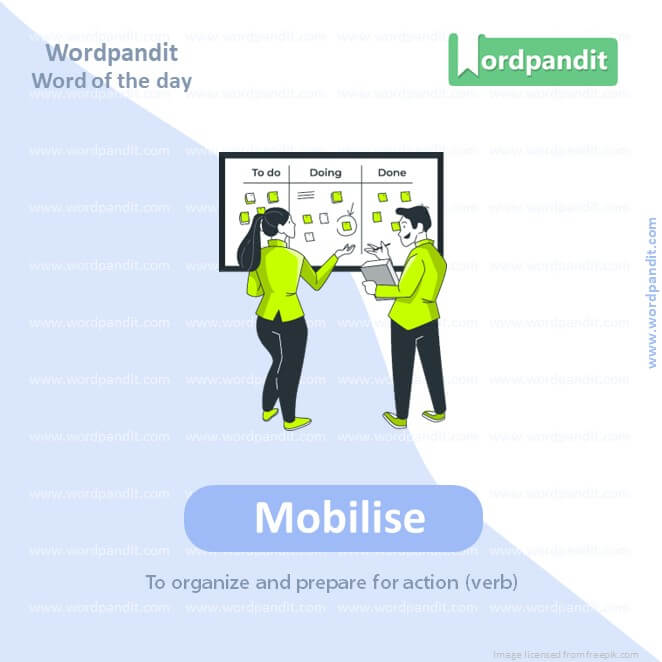Daily Vocabulary Words: List of Daily Used Words
Hi there. Welcome to this special section @ Wordpandit.
Our endeavour here is straightforward: highlighting important daily vocabulary words, you would encounter in The Hindu. This is your repository of commonly used words; essentially, we are posting a list of daily used words. Hence, this has significant practical application as it teaches you words that are commonly used in a leading publication such as The Hindu.
Visit the website daily to learn words from The Hindu.

WORD-1: Alliance
CONTEXT: CPI general secretary D. Raja speaks to The Hindu on the internal dynamics in the Indian National Developmental, Inclusive Alliance (INDIA) bloc, and the Left parties’ position within the alliance.
SOURCE: The Hindu
EXPLANATORY PARAGRAPH: Think of alliance like a special team-up. When two or more people, groups, or countries decide to work together because they have similar goals or want to help each other, that’s called an alliance. It’s like when you and your friends team up to build a big sandcastle together!
MEANING: A formal agreement or friendship between two or more parties to work together towards a common goal (noun).
PRONUNCIATION: uh-LYE-uhns
SYNONYMS: Partnership, Coalition, Union, Alliance, Affiliation, League, Confederation.
USAGE EXAMPLES:
1. The two countries formed an alliance to improve trade.
2. Superheroes often form alliances to defeat villains.
3. The alliance between the companies led to a successful project.
4. She believed in the strength of community alliances.
WORD-2: Dynamic
CONTEXT: CPI general secretary D. Raja speaks to The Hindu on the internal dynamics in the Indian National Developmental, Inclusive Alliance (INDIA) bloc, and the Left parties’ position within the alliance.
SOURCE: The Hindu
EXPLANATORY PARAGRAPH: Dynamic is a word that means something is always changing or full of energy. Imagine a superhero who can change into different forms – that’s dynamic! Or think about how you feel super energetic and can run really fast – that’s being dynamic too!
MEANING: Characterized by constant change, activity, or progress (adjective).
PRONUNCIATION: dy-NAM-ik
SYNONYMS: Energetic, Changing, Active, Vibrant, Lively, Animated, Spirited.
USAGE EXAMPLES:
1. She admired the dynamic nature of the city.
2. The dynamic speaker captivated the audience.
3. Technology is a dynamic field, always evolving.
4. Their dynamic relationship was full of surprises.

WORD-3: Negotiations
CONTEXT: The seat sharing negotiations have to begin at the State-level and we must conclude it at the earliest.
SOURCE: The Hindu
EXPLANATORY PARAGRAPH: Negotiations are like when you and your friends talk and decide what game to play so everyone is happy. It’s when people discuss something to reach an agreement or solve a problem, like deciding whether to play tag or hide-and-seek.
MEANING: Discussions aimed at reaching an agreement (noun).
PRONUNCIATION: nuh-go-shee-AY-shuhns
SYNONYMS: Talks, Discussions, Dialogues, Parleys, Conferences, Conversations, Deliberations.
USAGE EXAMPLES:
1. The negotiations between the two companies lasted weeks.
2. Diplomats are skilled in negotiations.
3. Peace negotiations helped end the conflict.
4. The union entered into wage negotiations with the management.
WORD-4: Varies
CONTEXT: The political situation varies from State to State. For example, in Tamil Nadu, one does not foresee many problems, even though there are speculations that the Congress may ask for more seats than they fought in 2019.
SOURCE: The Hindu
EXPLANATORY PARAGRAPH: Varies means things are not always the same. Like how the weather changes – some days it’s sunny, and other days it might rain. Or how different ice cream flavors taste different. That’s what varies means – not always the same!
MEANING: To be different in size, amount, degree, or nature from something else of the same general group (verb).
PRONUNCIATION: VAIR-eez
SYNONYMS: Changes, Differs, Fluctuates, Alters, Modifies, Shifts, Diversifies.
USAGE EXAMPLES:
1. The menu varies each day at the cafeteria.
2. Her mood varies depending on the weather.
3. The price of products varies from store to store.
4. The quality of the handmade products varies.

WORD-5: Foresee
CONTEXT: The political situation varies from State to State. For example, in Tamil Nadu, one does not foresee many problems, even though there are speculations that the Congress may ask for more seats than they fought in 2019.
SOURCE: The Hindu
EXPLANATORY PARAGRAPH: Foresee is like having a magic power to know what will happen in the future. It’s when you think about what might happen later, like guessing it might rain because you see dark clouds.
MEANING: To know or predict what will happen in the future (verb).
PRONUNCIATION: for-SEE
SYNONYMS: Predict, Anticipate, Expect, Envision, Project, Foretell, Presage.
USAGE EXAMPLES:
1. She couldn’t foresee the consequences of her decision.
2. The company tried to foresee future market trends.
3. He had the ability to foresee potential problems.
4. No one could foresee the pandemic’s impact.
WORD-6: Speculations
CONTEXT: The political situation varies from State to State. For example, in Tamil Nadu, one does not foresee many problems, even though there are speculations that the Congress may ask for more seats than they fought in 2019.
SOURCE: The Hindu
EXPLANATORY PARAGRAPH: Speculations are like guesses about things that might happen or why they happen. It’s like when you try to guess who ate the last cookie without really knowing. You’re just thinking and guessing about it!
MEANING: The forming of theories or conjectures without firm evidence (noun).
PRONUNCIATION: spek-yuh-LAY-shuhns
SYNONYMS: Guesses, Theories, Conjectures, Hypotheses, Assumptions, Suppositions, Surmises.
USAGE EXAMPLES:
1. There were many speculations about the celebrity’s life.
2. His disappearance led to wild speculations.
3. The market was rife with speculations about the merger.
4. The book was based on historical speculations.

WORD-7: Accommodate
CONTEXT: If they don’t accommodate Left parties properly, then Left parties can’t keep away from electoral battles.
SOURCE: The Hindu
EXPLANATORY PARAGRAPH: Accommodate is like making room or helping someone feel comfortable. If your friend wants to sit next to you, you scoot over to make space – that’s accommodating. Or if you help someone by sharing your toys, that’s being accommodating too!
MEANING: To provide room for someone or adjust to fit their needs (verb).
PRONUNCIATION: uh-KOM-uh-date
SYNONYMS: Adjust, Adapt, Fit, Suit, Cater to, Provide for, Make room for.
USAGE EXAMPLES:
1. The hotel can accommodate up to 500 guests.
2. We need to accommodate the new regulations.
3. The car design was modified to accommodate more passengers.
4. She tried to accommodate her schedule to meet her friend.

WORD-8: Mobilise
CONTEXT: I agree that time is short. We will have to put our heads together to organise everything and mobilise people.
SOURCE: The Hindu
EXPLANATORY PARAGRAPH: Mobilise is like getting ready for action. It’s when people or things start moving or preparing to do something important, like when everyone in class gets ready to go on a field trip.
MEANING: To organize and prepare for action (verb).
PRONUNCIATION: MOH-buh-lyze
SYNONYMS: Activate, Rally, Marshal, Assemble, Organize, Prepare, Deploy.
USAGE EXAMPLES:
1. The charity mobilised volunteers for the event.
2. The army was mobilised at the border.
3. They mobilised support for the campaign.
4. Efforts were mobilised to help the disaster victims.
WORD-9: Conceded
CONTEXT: Telangana is the only State out of the five that went for Assembly elections recently where the Congress conceded seats for an ally. Are there any lessons there?
SOURCE: The Hindu
EXPLANATORY PARAGRAPH: Conceded is like admitting something is true or giving in. Like if you say you did eat the last cookie after someone asks, that’s conceding. Or letting your friend win in a game because they’re sad.
MEANING: To admit that something is true or valid after first denying or resisting it (verb).
PRONUNCIATION: kuhn-SEED-ed
SYNONYMS: Admitted, Acknowledged, Accepted, Allowed, Granted, Confessed, Yielded.
USAGE EXAMPLES:
1. He finally conceded that he was wrong.
2. The politician conceded defeat after the election results.
3. She conceded the point during the debate.
4. The company conceded to the workers’ demands.
WORD-10: Barely
CONTEXT: There is barely any time left for the 2024 General Election, but the INDIA bloc hasn’t had a single public meeting, and hasn’t finalised a seat sharing formula. Is it too late?
SOURCE: The Hindu
EXPLANATORY PARAGRAPH: Barely is like just enough or almost not. Imagine you’re running a race and you cross the finish line just a second before time runs out. That’s barely making it! Or when you find the last piece of candy in the jar – that’s barely having any left!
MEANING: Only just; hardly; by a small margin (adverb).
PRONUNCIATION: BAIR-lee
SYNONYMS: Hardly, Just, Merely, Scarcely, Only just, Narrowly, Almost not.
USAGE EXAMPLES:
1. She barely made it to the bus on time.
2. He could barely see in the dim light.
3. They barely had enough food for everyone.
4. The movie barely held my interest.
Vocabulary Synonyms
In the intricate weave of language learning, ‘vocabulary synonyms’ emerge as a key element that adds depth and variety to expression. These different words with similar meanings enrich our vocabulary, enabling us to communicate with precision and clarity. However, grasping ‘vocabulary synonyms’ successfully warrants a systematic approach.
When approaching ‘vocabulary synonyms’, context is your compass. Engage with various reading materials like novels, newspapers, and digital content to explore and understand how these synonyms are used in different situations. This exposure will fortify your comprehension of ‘vocabulary synonyms’ and their usage nuances.
Employing memory-enhancing techniques can cement your grasp on ‘vocabulary synonyms’. Employing flashcards is an effective method where one side contains the word you know, and the other side has its synonyms. Also, creating mind maps, linking the known word to its various synonyms, can be an engaging way to learn ‘vocabulary synonyms’.
To master ‘vocabulary synonyms’, take an active role in application. Regular conversations, written communications, digital interactions – all of these offer ample opportunities to utilize learnt synonyms. This practice refines your application and accelerates internalization of ‘vocabulary synonyms’.
Embracing language exchange platforms or engaging with native speakers can provide invaluable feedback on the usage of ‘vocabulary synonyms’. This interaction can further enhance your understanding of the cultural idiosyncrasies of word usage.
In conclusion, learning ‘vocabulary synonyms’ is a rewarding pursuit that adds layers of complexity to your language skills. A thoughtful blend of diversified resources, memory tools, practice, and interactive learning can make the task of mastering ‘vocabulary synonyms’ an enjoyable and fruitful journey. Every synonym learnt paints your vocabulary with different shades of understanding, making your language canvas all the more vivid and spectacular!













